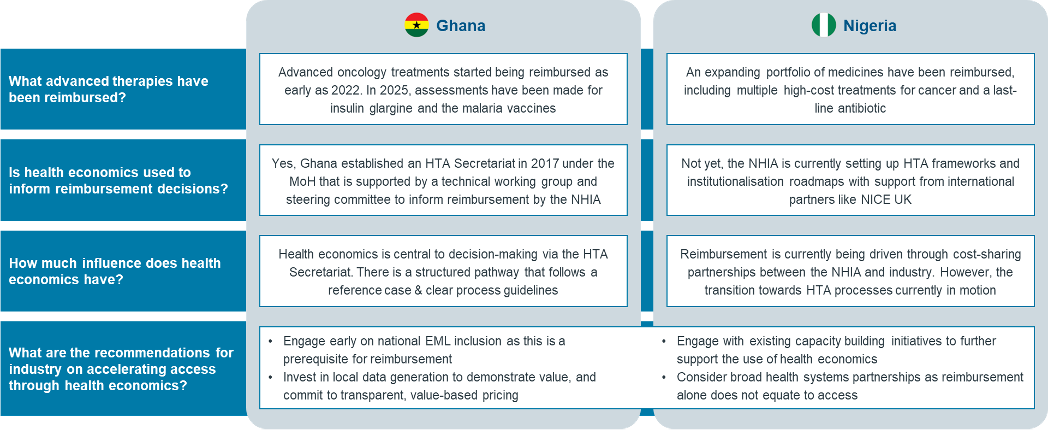

































- Locations
- Middle East & Africa
- Reimagining Healthcare Access in West Africa Through Health Economics
As healthcare systems across West Africa face mounting pressures—from rising chronic disease burdens to declining donor funding—the need for smarter, data-driven decision-making has never been more urgent. In a recent webinar hosted by IQVIA, experts from Ghana, Nigeria, and the private sector came together to explore how health economics can be a transformative tool in shaping policy, guiding investment, and improving access to care.
Ghana’s Progress: Institutionalizing HTA
Dr. Daniel Ankrah provided a deep dive into Ghana’s journey with Health Technology Assessment (HTA). Since 2017, Ghana has established a formal HTA Secretariat, developed process guidelines, and published a reference case adopted by international bodies. HTA in Ghana is now actively shaping reimbursement decisions, including the inclusion of pediatric oncology treatments and the evaluation of malaria vaccines.
“HTA gives us maximum benefits for every spending we make. It affords us equity, bargaining power, and cost containment,” said Dr. Ankrah.
Nigeria’s Momentum: Strategic Purchasing and Innovation
Dr. Yakubu Agada-Amade highlighted Nigeria’s evolving approach to integrating health economics. The National Health Insurance Authority (NHIA) has begun reimbursing high-impact technologies, including oncology drugs and diagnostics, through cost-sharing partnerships with pharmaceutical companies.
“We’re asking industry players to shift from being suppliers to system builders. Co-invest in local data, support HTA, and commit to transparent, value-based pricing,” urged Dr. Agada-Amade.
Nigeria is also developing a formal HTA framework, with plans to commission studies and build institutional capacity in collaboration with global partners.

Industry’s Role: Driving Access and Sustainability
Muhammad Abdulkarim, representing the private sector, emphasized the importance of clear engagement processes and collaborative models. He noted that innovative reimbursement programs are already expanding access, reducing medical tourism, and enabling hospitals to stock life-saving medicines.
“With these programs, patients who couldn’t afford treatment before are now staying longer on therapy. This is the right direction,” he said.
Why Health Economics Matters Now More Than Ever
Isiuwa Onayiga, Manager, English Speaking West Africa, IQVIA, emphasized on the broader role of health economics in strengthening healthcare systems. She highlighted the importance of generating real-world evidence, deploying digital health tools, and conducting cost-effectiveness studies to inform policy and remove barriers to care.
IQVIA’s work across Africa centers on data for health—from clinical trials and digital tools to health system evaluations and strategic planning. The organization is committed to supporting governments, payers, and industry partners in building sustainable, evidence-based healthcare systems.
“Health economics is particularly important today as we face constrained budgets and rising demand. It helps us do more with less and make smarter, more equitable decisions,” said Isiuwa Onayiga.
Watch the Webinar On-Demand
If you missed the live session, you can watch the full webinar here: https://event.on24.com/wcc/r/5030034/52A047E087961E1FFF0CF8AE2F09DB76
